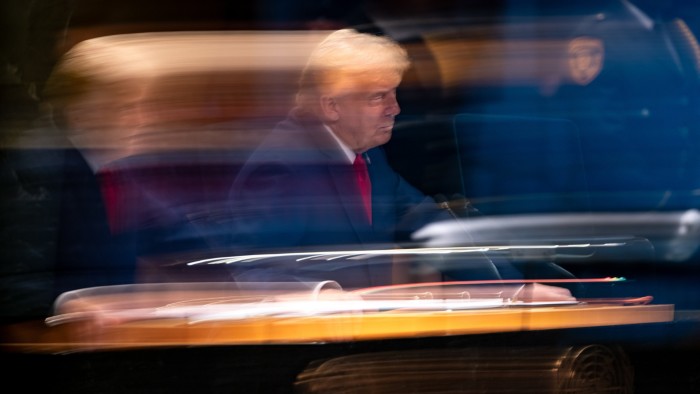Unlock the White House Watch newsletter for free
Your guide to what Trump’s second term means for Washington, business and the world
It is more than six decades since a youngish Fidel Castro took to the podium at the UN headquarters and then remained there for a crisp 269 minutes to deliver the longest timed speech in the General Assembly’s history.
As Donald Trump’s rambling address on Tuesday moved towards the one-hour mark it looked as if the Cuban revolutionary’s record might be up for the taking. As it was he bowed out well short. Instead he settled for another achievement, delivering surely the most scattergun, repetitive and oddball address ever given by a US president at the UN.
The annual UN General Assembly is traditionally one of the few times in the calendar when an American president delivers a speech in the US squarely focused on the world. After a bit of rah-rah throat-clearing about the successes he claimed to have pulled off in the first eight months of his second term, Trump did indeed turn to the world. But his focus was not the wrenching issues and wars dominating the headlines.
Rather he returned again and again to two obsessions of the “America-first” movement: lambasting mass migration as destroying the soul of the west and depicting measures to mitigate climate change as the follies of feckless liberals.
Climate change, he said, to a silent hall, is “the greatest con job ever perpetrated on the world”, adding renewables “are a joke; they don’t work”. As for immigration, he lectured Europe that “it’s time to end that experiment with open borders . . . Your countries are going to hell.”
If the rhetoric had an echo, it was of Trump’s doomsday first inaugural address in January 2017, when he painted a picture of a dystopian America and talked of “carnage” in the deindustrialised heartland. Representatives of the 193 member states listened as he went on and on and on, often addressing what most surely regarded as niche if not bizarre obsessions for the most powerful leader in the world.
One moment he bemoaned the state of the Scottish countryside, which he presented as scarred by a profusion of wind turbines, the next he castigated London’s mayor, Sadiq Khan, a long-standing target of his spleen, whom he — falsely — accused of promoting sharia law.
“I love Europe,” he said. “I hate to see it being devastated by energy and immigration. You are doing it because you want to be nice and politically correct.”
“The carbon footprint,” he added, “is a hoax made up by people with evil intentions.”
In the countdown to his delivery, UN staff had traded alarmist speculation that Trump would use his address to downgrade his country’s relationship to the international body. Among the scenarios were that he would unveil more US cuts to humanitarian aid, and might even threaten to uproot the UN from New York.
Even the UN’s allies concede it faces possibly the most difficult outlook of its 80 years — a crisis of finances, morale and relevance. The UN “is not even coming close to living up to [its] potential”, Trump said. Few in the audience could put their hands on their hearts and disagree — although Trump’s relentless unilateralism is a major factor behind the organisation’s seeming drift to the international sidelines.
Trump was also given a golden opportunity to mock the UN. Right at the start of his speech it transpired the teleprompter was not working — a gift of a metaphor for a man who has long disdained the UN not just as in hock to progressive values but also as an incompetent behemoth.
“I can only say that whoever is operating this teleprompter is in big trouble,” Trump said to genuine laughter in the chamber.
When it transpired that the escalator taking him to the assembly chamber high up in the 39-storey UN headquarters had also malfunctioned, the stage seemed set for a sustained Trump critique.
But in a silver lining for the UN and its allies there was no new démarche on the US-UN relationship. And anyway, just when it seemed the president was getting warmed up on one theme, he would meander in another direction or return to an old and favourite frustration.
His allies argue his speech was about delivering peace. He earned applause when he called for Hamas to release the last Israeli hostages. He also for the first time held out an olive branch to Brazil’s president, Luiz Inácio Lula da Silva, after months of tension between the two. But this is not why his speech will be remembered like Castro’s down the ages.
This is a man who makes it abundantly clear he is still rankled that the UN turned down his multibillion-dollar bid in the early 2000s to refashion its headquarters in marble and mahogany. And he has an obsession with windmills.
After listening to the 2017 inauguration speech, former president George W Bush is said to have observed: “That was some weird shit.”
This was the global version of that, and for most of the people in the chamber, it was certainly weird.

